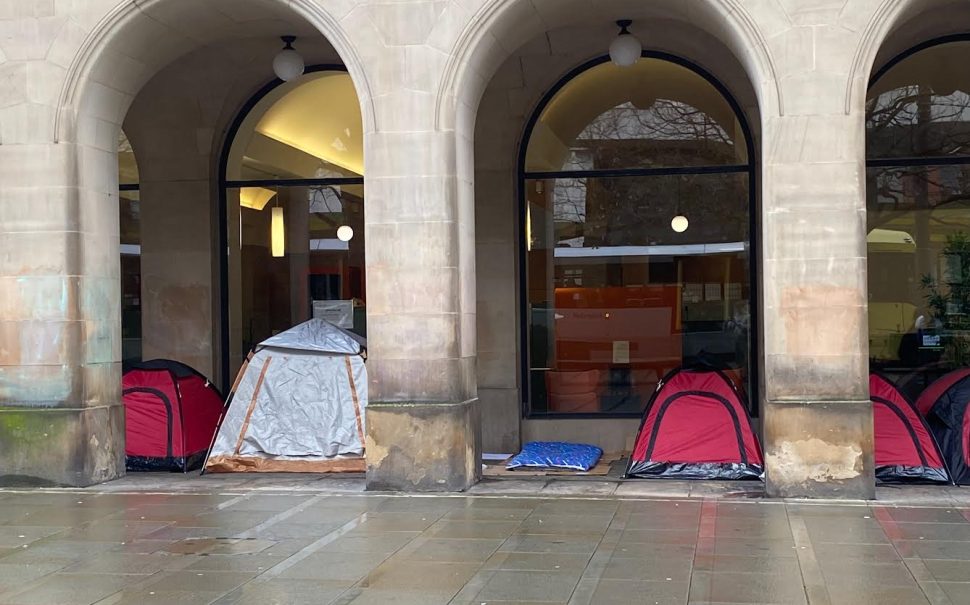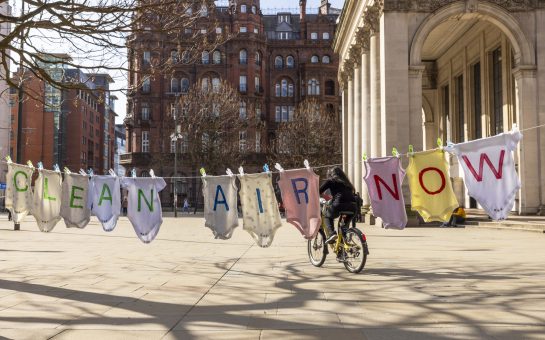The number of tents underneath the arches of Manchester Town Hall has increased to 34, the highest number ever.
The encampment now reaches round both sides of the building, taking up all the space under the arches facing St Peter’s Square and facing the Mount Street side of the building.
The occupants are a mixture of refugees, activists who are not homeless, and rough sleepers, according to Manchester City Council.
Zack, a charity worker who was spending his lunchtime talking to and providing support to those living under the arches, said that the council was giving mixed messages over whether it had done everything it could to help them.
“It’s been pouring down with rain, we’ve had some quite cold nights recently that has affected their health adversely. Just getting them into some kind of safe shelter is the main aim.
“Since Covid [the number of homeless] has grown uncontrollably – people here don’t really know the correct method to get a home, so they’ve been left homeless for quite some time.
“Even if it’s temporary, get them out of the cold, get them out of the rain, get them into a healthy home.”
However, according to the council, some of the rough sleepers have refused offers of support.
In February, Manchester City Council leader Bev Craig wrote a letter to the government in which she revealed that more than three-quarters homeless people requesting help had travelled from outside Greater Manchester, and that half had previously been in asylum-seeker accommodation.
She said: “We have a long and rich history in Manchester of welcoming and supporting refugees and asylum seekers that have been displaced.
“But the scale of the number of people arriving to Manchester homeless is unprecedented.
“This is stretching public services and voluntary sector services to breaking point.”
When approached for comment by Mancunian Matters, a spokesperson for Manchester CIty Council said: “We continue, along with partner organisations, to provide help and support to those who are homeless and our homelessness teams are engaging with them.
“We have allowed this camp to be in place for more than a week and remain sympathetic to the plight of individuals.
“However, we have to be clear that camping outside the town hall will not gain people preferential treatment relative to others in need and that we cannot allow such encampments to create an obstruction to those going about their day-to-day business. As such we have politely told them they have to leave.”





Join the discussion
Engels’ The Condition of the Working Class in England (1844) is a classic analysis of the appalling conditions of our class in Britain during his stay in Manchester and Salford. There have, undoubtedly, been some improvements since then: smallpox has been eradicated and deaths from diseases such as measles, scarlet fever and whooping cough are very rare. In The Housing Question (1887) he shows how and explains why reforms within capitalism always come up short. Neither news of a ‘homeless community found living in dark, squalid tunnels… under the streets of Manchester’ (thesun.co.uk, 2 May, 2017) nor the growing use of tents as homes should come as a surprise. There are more than enough empty dwellings in Manchester and elsewhere to accommodate the homeless but because houses are produced for profit there is no possibility of a rational approach to housing within capitalism. Engels is clear: ‘as long as the capitalist mode of production continues to exist, it is folly to hope for an isolated solution of the housing question or of any other social question affecting the fate of the workers’.